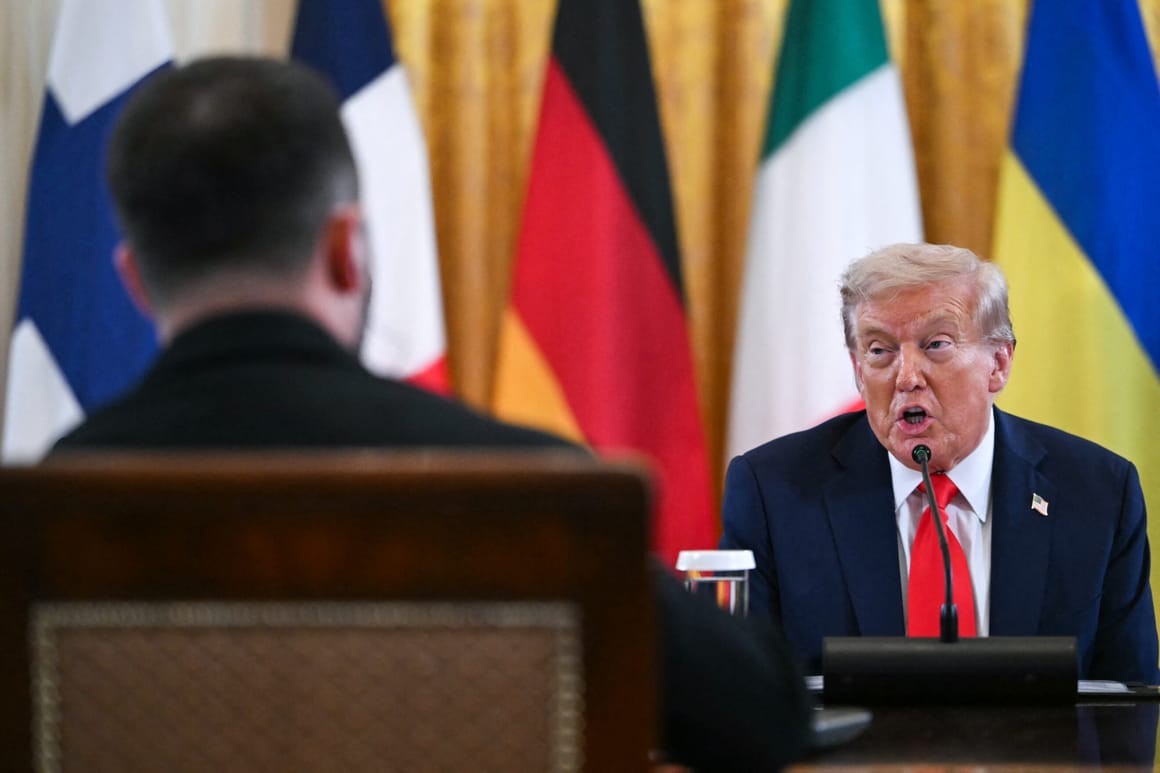Politics
Fears of a Modern Munich: Ukraine’s High-Stakes Negotiations

Concerns are rising in Europe as high-level discussions unfold in Washington regarding Ukraine’s future in the ongoing conflict with Russia. On March 15, 2025, Ukrainian President Volodymyr Zelenskyy is set to meet with former U.S. President Donald Trump, who recently engaged with Russian President Vladimir Putin. There are fears that Trump may influence Ukraine to concede significant territorial control in the eastern Donbas region, echoing the historical failures of the 1938 Munich Agreement.
The Munich Agreement, which allowed Nazi Germany to annex Czechoslovakia’s Sudetenland without resistance, serves as a cautionary tale. It led to the rapid disintegration of Czechoslovakia’s defenses, an outcome many analysts believe could be mirrored if Ukraine relinquishes critical defensive positions. “It is crucial for Europe not to turn this into another Munich or Yalta moment,” warned Tomáš Kopecký, a Czech government commissioner focused on Ukraine’s reconstruction.
Trump’s previous comments suggesting a peace deal might involve Ukraine ceding control over the entirety of Donetsk and Luhansk provinces have heightened these fears. Currently, Russia occupies nearly all of Luhansk and three-quarters of Donetsk, and Zelenskyy has firmly opposed any such concession. “We will not leave Donbas. We cannot do this,” he stated emphatically, recognizing that ceding territory would only set the stage for further Russian aggression.
Military analysts from the Institute for the Study of War emphasize that the Kremlin’s demands for Ukraine to hand over its “fortress belt”—a heavily fortified defensive line—could severely compromise its military capabilities. This line, fortified over the past eleven years, represents the backbone of Ukraine’s defense strategy. Losing this territory would push Russia’s frontline significantly westward, forcing Ukraine to establish defenses in less advantageous, open terrain.
Zelenskyy reiterated the consequences of such a move: “If we leave Donbas, we will clearly open a bridgehead for preparing an offensive by the Russians.” Analysts concur, stating that a ceasefire under such terms would provide Moscow with a superior position for future military operations while demonstrating its lack of genuine interest in constructive negotiations.
The historical lens through which these negotiations are viewed is significant. In September 1938, Western powers, seeking to prevent war, coerced Czechoslovakia into conceding territory to Hitler—a decision that led to catastrophic consequences. Olexiy Haran, a professor at the National University of Kyiv-Mohyla Academy, highlighted that without robust security guarantees, freezing the conflict could lead to another Munich scenario.
Haran cautioned that signing any ceasefire agreement without adequate protections would allow Russia to assert control over Ukrainian territories indefinitely, repeating past mistakes when concessions merely invited further hostilities. Furthermore, Yaroslav Hrytsak, a historian at the Ukrainian Catholic University, pointed out the potential for significant human consequences, reminiscent of the ethnic cleansing experienced during World War II.
On the diplomatic front, NATO officials from Eastern Europe are wary of Russia’s intentions, noting its attempts to leverage peace talks to gain advantages not achieved on the battlefield. A report from the Latvian intelligence agency indicated that Russia acknowledges its inability to reach its maximalist goals militarily and is thus seeking to pressure Ukraine into concessions through various means.
Despite these apprehensions, there are notable differences between the current geopolitical landscape and that of 1938. Unlike Czechoslovakia, which was excluded from discussions, Zelenskyy is directly engaged with Trump, advocating for a ceasefire that respects the existing front lines between Ukrainian and Russian forces. Some European officials express cautious optimism that the U.S. will not forsake its European allies in these negotiations.
Kopecký reassured observers, stating, “I do not see this happening. Trump is talking with Zelenskyy and with European allies. This is not what Munich and Yalta looked like.” The outcome of these discussions may play a crucial role in determining Ukraine’s future and the broader stability of Europe in the face of Russian aggression.
-

 Health3 months ago
Health3 months agoNeurologist Warns Excessive Use of Supplements Can Harm Brain
-

 Health3 months ago
Health3 months agoFiona Phillips’ Husband Shares Heartfelt Update on Her Alzheimer’s Journey
-

 Science1 month ago
Science1 month agoBrian Cox Addresses Claims of Alien Probe in 3I/ATLAS Discovery
-

 Science1 month ago
Science1 month agoNASA Investigates Unusual Comet 3I/ATLAS; New Findings Emerge
-

 Science4 weeks ago
Science4 weeks agoScientists Examine 3I/ATLAS: Alien Artifact or Cosmic Oddity?
-

 Entertainment4 months ago
Entertainment4 months agoKerry Katona Discusses Future Baby Plans and Brian McFadden’s Wedding
-

 Science4 weeks ago
Science4 weeks agoNASA Investigates Speedy Object 3I/ATLAS, Sparking Speculation
-

 Entertainment4 months ago
Entertainment4 months agoEmmerdale Faces Tension as Dylan and April’s Lives Hang in the Balance
-

 World3 months ago
World3 months agoCole Palmer’s Cryptic Message to Kobbie Mainoo Following Loan Talks
-

 Science4 weeks ago
Science4 weeks agoNASA Scientists Explore Origins of 3I/ATLAS, a Fast-Moving Visitor
-

 Entertainment4 months ago
Entertainment4 months agoLove Island Star Toni Laite’s Mother Expresses Disappointment Over Coupling Decision
-

 Entertainment3 months ago
Entertainment3 months agoMajor Cast Changes at Coronation Street: Exits and Returns in 2025









